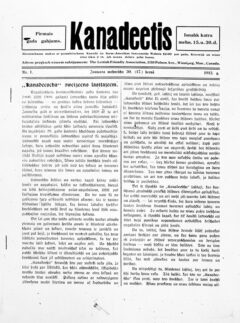One of the accomplishments of 2016 is finally publishing research on Kanādietis, a semi-monthly newspaper produced from 1913-1914 in Winnipeg, Manitoba. The paper had the distinction of being the only known publication in the Latvian language published in Canada before the Second World War.

Central to the newspaper was its editor, Jānis A. Šmits (1876-1942), a somewhat controversial figure who dreamed of reconciling the Christian nationalists and the socialists who had come to define the two major ideologies of Latvian immigrants in North America. Šmits in 1912 helped found the Winnipeg Lettish Friendly Association, a civic organization that was viewed by Latvian socialists as competition. The following year, the association began publishing Kanādietis.
Šmits ultimately failed in his efforts to bring the Christian nationalists and the socialists together. His newspaper lasted just through the end of 1913, when a downturn in the Canadian economy and a lack of subscriptions combined to force Šmits to suspend publication. He produced just one more edition in July 1914. However, the newspaper provides a window into Latvian immigrant life in the western provinces of Canada during a specific time period, as well as illuminates the mindset of its editor.
One of the difficulties of researching Kanādietis was finding primary sources. Almost none exist that provide insight into the newspaper’s operations. Even locating the newspaper is difficult. As far as I could determine, just two institutions have collections of Kanādietis. The Wisconsin Historical Society has microfilm of all the 1913 issues, but not of the July 1914 newspaper. Meanwhile, the National Library of Latvia in Rīga has physical copies of half of the 1913 numbers, but its holdings fortunately include the final issue.
Šmits and his family returned to the homeland in 1919, where he rose to become director of the Rīga English Institute (Rīgas Angļu institūts). That may explain why some of his diaries wound up in the National Library of Latvia’s Rare Books and Manuscripts Collection. Those essentially tell about his escape from Latvia following the 1905 Revolution and his voyage to England, where he lived for a few years before emigrating to Canada. Unfortunately, they do not tell about his life in Manitoba or his work with Kanādietis.
Much of the rest of the editor’s story was assembled from his own writings in Kanādietis and other newspapers, mentions of Šmits in other emigrants’ remembrances, and a useful (albeit not entirely accurate) letter from his son, Rudolfs, sent to the late Latvian exile journalist and historian Osvalds Akmentiņš, whose manuscript collection is housed in the Immigration History Research Center Archives at the University of Minnesota.
Šmits, deported in 1941 during the first Soviet occupation of Latvia, died in Siberia. His wife, Anna, also was deported, but Soviet authorities allowed her to emigrate in 1960 to join Rudolfs and his family in the United States.
My research paper, “A Telephone Station for the Soul”: The Latvian Newspaper Kanādietis, 1913-1914, appears in the spring 2016 issue of Manitoba History.
Accessed on 20 Apr 2024.
The article may be found online at https://straumanis.com/2016/researching-kanadietis/.
